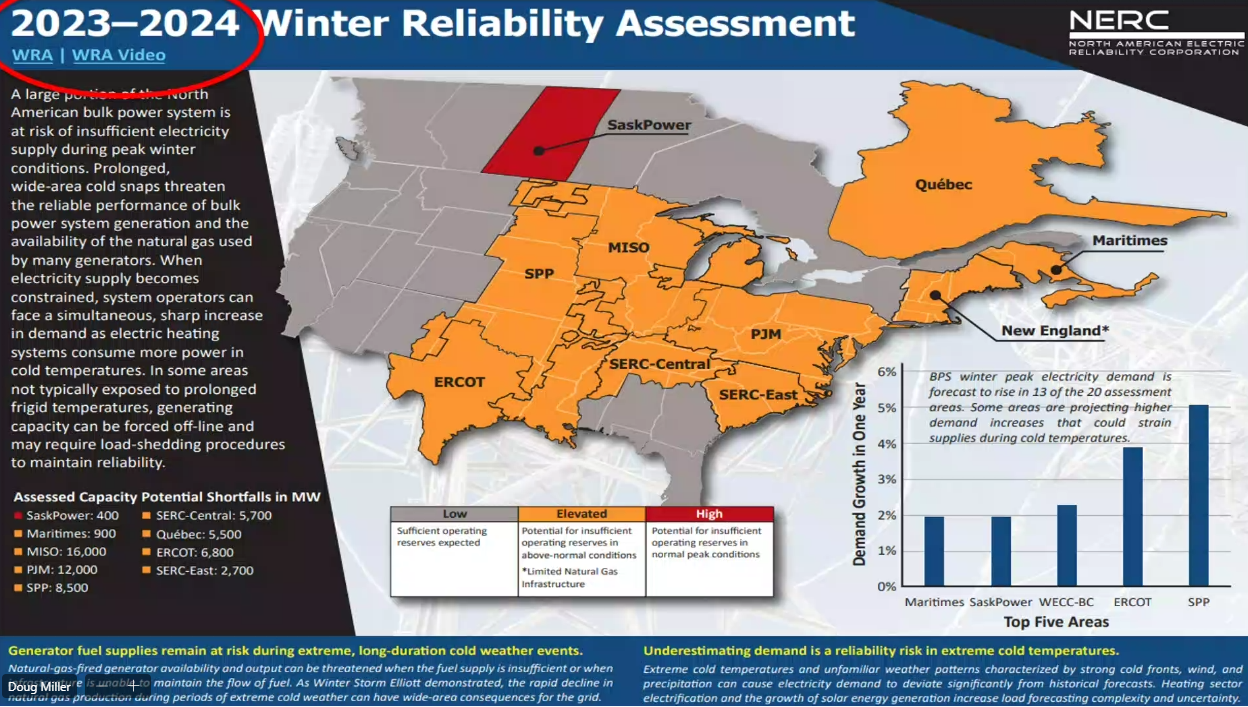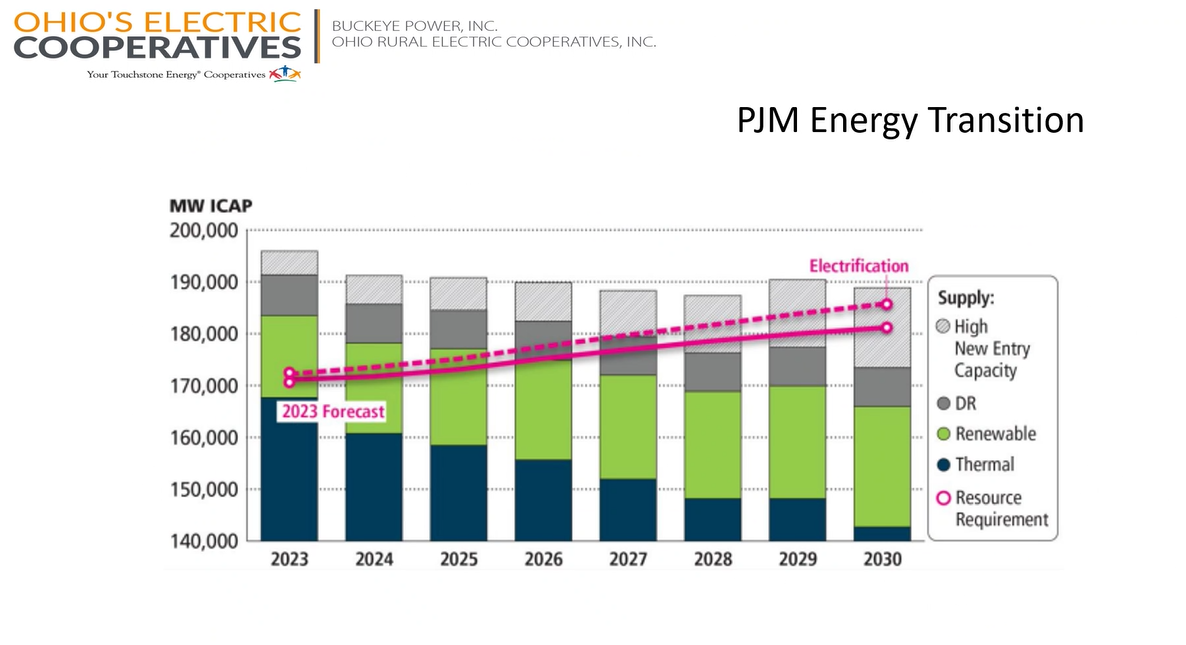Every year, Tricounty Rural Electric Cooperative asks our members to be prepared in case of outages.
This year, however, our concern goes beyond the standard winter risks, and in contrast to problems your co-op can correct — like trees falling on our lines — this threat is beyond our control. Electricity consumers in our region now also face the possibility of outages caused by shortfalls in available electricity.
Around Christmastime last year, bitter cold and extreme conditions during Winter Storm Elliott caused a spike in electricity demand that outstripped what was available in nearby states, and electric utilities were forced to shut down power to some residents to avert widespread uncontrolled outages. Ohio only narrowly avoided such rolling blackouts.
Industry experts now are warning that Ohio and much of the Midwest and eastern U.S. are at risk for similar scenarios if severe weather strikes again this winter.
The North American Electric Reliability Corporation (NERC) is the nation’s grid watchdog. For years, the organization has issued a string of increasingly dire reports warning that threats to grid reliability are mounting and more frequent rolling blackouts could soon become the norm.
In its 2023-2024 Winter Reliability Assessment (released in Nov. 2023), NERC warned that half of the nation faces the risk of blackouts during extreme weather this winter. (Click here to read the full report.)

Looking further into the future, the picture gets even more grim. Over the next five years, NERC forecasts that all or parts of 19 states from Montana to Louisiana are at high risk of rolling blackouts during normal peak conditions. And most of the country faces similar risk when demand for electricity spikes during exceedingly hot or cold temperatures.
The culprit? Government energy policy. The premature closing of reliable fossil-fuel power plants has narrowed the gap between the supply of available electricity and the ever-growing demand for power. Intermittent renewable energy sources like wind and solar don't run 24/7/365 and can't cover the gap in demand during extreme weather.
*Note that Tricounty Rural Electric Cooperative is not against renewable energy; we have solar, wind, and hydro as part of our generation portfolio. This industry issue is because of the unrealistic transition timeline being forced by government policy before technology is ready. Adding renewable sources is NOT hurting the grid; removing baseload generation like coal plants IS.
When a winter storm drives even higher demand — and threatens supply at the same time — those charged with maintaining balance on the grid may require local utilities to reduce electricity use.

To address this, America’s Power, the only national trade organization whose sole mission is to advocate at the federal and state levels on behalf of the U.S. coal fleet, submitted comments on EPA’s Supplemental Proposal requesting public comments on the reliability impacts of the Carbon Rule.
National Rural Electric Cooperative (NRECA) CEO Jim Matheson's Op-Ed on this "sobering" energy policy dilemma was run by Fox News on Jan. 5, 2024, stating "we are quickly reaching a point where there won't be enough electricity to go around."
The assessment also recommended grid balancing authorities (like PJM) should also "be cognizant of the potential for short-term load forecasts to underestimate load in extreme cold weather events," the assessment said. In addition, reliability coordinators and balancing authorities should monitor fuel supplies and prepare operating plans to manage potential shortfalls, NERC said.
The winter performance of the U.S. bulk power system will depend on fuel availability, according to John Moura, NERC's director of reliability assessment and performance analysis.
"Whether there's going to be reliability risks in certain areas really depends on whether the wind output is as strong as we forecast it to be," Moura said. "In areas where we have a lot of natural gas reliance, it's highly dependent on whether there's fuel for natural gas generators."
Buckeye Power’s peaking plants, Mone and Greenville, are prepared, and keep a supply of diesel fuel on hand to ensure continual operation this winter, should Ohio experience another extreme cold event.
What this means for our cooperative
Tricounty Rural Electric Cooperative and our electricity generation cooperative, Buckeye Power, will closely watch conditions and stay in constant contact with the regional authority that manages our portion of the electric grid. We have plans in place to clearly and quickly communicate with members if we expect an energy emergency is likely or imminent.
We’ll use all available communication channels to keep you updated and will alert you if energy conservation is urgent or forced outages are likely to occur.
What this means for you
In addition to the possibility of “normal” winter outages, there’s an increased chance that your electric service could be interrupted by rolling blackouts.
We all can take steps to reduce the likelihood of this happening:
- Conserve energy, particularly on the coldest days. This might mean delaying doing laundry or running the dishwasher until temperatures rise. You might throw on an extra clothing layer and lower your thermostat by a few degrees to stay comfortable while using less electricity.
- Pay attention to calls for conservation and make extra effort to reduce electricity use if an alert goes out that the grid is in danger from electricity shortfalls. You may notice the peak status bar on our website; we will keep this updated to keep you informed of current demand.
You can also be prepared for winter outages by:
- Ensuring the co-op has correct, current contact information for you. If the phone number or email on your account may be out of date, call the office or send us a message here.
- Connecting to the co-op through the SmartHub app. We’ll use this to keep you informed about outages.
- Gathering supplies and having a plan to stay safe in case an outage occurs.
Your electric cooperative can't control the weather, but rest assured that we’ll continue doing everything we can to provide you with reliable electric service, no matter what Mother Nature sends our way.
We are also committed to keeping you informed every step of the way. Please continue reading your monthly Ohio Cooperative Living magazine for industry updates.

